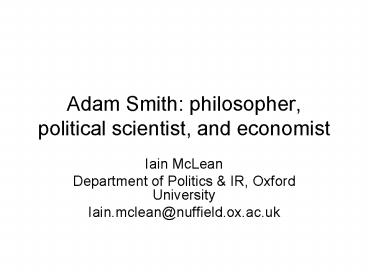Adam Smith: philosopher, political scientist, and economist - PowerPoint PPT Presentation
1 / 17
Title:
Adam Smith: philosopher, political scientist, and economist
Description:
Adam Smith: philosopher, political scientist, and economist Iain McLean Department of Politics & IR, Oxford University Iain.mclean_at_nuffield.ox.ac.uk – PowerPoint PPT presentation
Number of Views:554
Avg rating:3.0/5.0
Title: Adam Smith: philosopher, political scientist, and economist
1
Adam Smith philosopher, political scientist, and
economist
- Iain McLean
- Department of Politics IR, Oxford University
- Iain.mclean_at_nuffield.ox.ac.uk
2
Outline of talk
- The few true PPEists
- The Scottish Enlightenment and AS
- Philosophy ethics and TMS
- Economics in TMS and WN
- Political science
- AS the pioneer of public choice
- And as policy advisor
- AS at the US Constitutional Convention 1787
3
The Scottish Enlightenment
- Act of Union 1707
- A true bargain
- Weak church in a weak state
- Religious pluralism
- Room to think without being hanged
- Need to think of a non-religious basis for ethics
- Glasgow, Aberdeen, Edinburgh all become centres
4
TMS (the Theory of Moral Sentiments 1759/1790)
- Primarily descriptive, analytic
- What is a moral sentiment and where do they come
from? - Impartial spectator introspection
- Review of ancient (significantly, not Christian)
schools of philosophy - First real appearance of invisible hand
- Two-line summary by Robert Burns
5
TMS IV.i.10 (pp. 184-5)
- The rich are led by an invisible hand to make
nearly the same distribution of the necessaries
of life, which would have been made, had the
earth been divided into equal portions among its
inhabitants, and thus without intending it,
without knowing it, advance the interests of the
society, and afford the means to the
multiplication of the species
6
To a Louse on seeing one on a ladys bonnet at
church (R. Burns 1786), last verse
- O wad some Power the giftie gie us
- To see oursels as ithers see us!
- It wad frae mony a blunder free us,
- An foolish notion
- What airs in dress an gait wad leae us,
- An evn devotion!
7
WN (Wealth of Nations1776)
- The so-called Adam Smith problem
- TMS recommends altruism WN recommends
selfishness - Part of the same lecture series (notes
rediscovered 1895/1958) - Neither of them recommend anything directly
- Both describe consequences of actions
8
A big rich book, impossible to summarise but
- Division of labour and productivity
- Look at 20 note
- Actually AS probably plagiarised that bit
- Free trade, limited government
- Pioneer analysis of rent-seeking
- Contra Hayek / Friedman / Thatcher, AS is not
anti government. He is anti rent-seeking
government
9
WN IV.vii.c.63
- To found a great empire for the sole purpose of
raising up a people of customers, may at first
sight, appear a project fit only for a nation of
shopkeepers. It is, however, a project altogether
unfit for a nation of shopkeepers, but extremely
fit for a nation whose government is influenced
by shopkeepers. Originally ends that is governed
by shopkeepers
10
Some more insights
- On herring bounty, designed to train sailors for
the Royal Navy - It has, I am afraid, been too common for
vessels to fit out for the sole purpose of
catching, not the fish, but the bounty
(IV.v.a.32) - People of the same trade seldom meet together,
even for merriment and diversion, but the
conversation ends in a conspiracy against the
publick, or in some contrivance to raise prices
(I.x.c.27)
11
and more
- The discipline of colleges and universities is in
general contrived, not for the benefit of the
students, but for the interest, or more properly
speaking, for the ease of the masters. (V.i.f.15) - We rarely hear, it has been said, of the
combinations of masters, though frequently of
those of workmen. But whoever imagines, upon this
account, that masters rarely combine, is as
ignorant of the world as of the subject. (I.viii
12-13)
12
Therefore the role of government is to prevent or
overcome market failure
- Canals
- Roads
- Defence
- Education
- Culture
- Anti-monopoly regulation
13
AS and politics
- Very zealous in American affairs, 1776
- AS as government special adviser
- On American taxation
- ?On Quebec Act
- On principles of taxation
- Applies principles derived from economics
- Align incentives correctly
14
AS at the Constitutional Convention 1787
- He wasnt there but
- Church and state
- Humes position
- ASs position
- Madison and maybe Jefferson take ASs side
- Virginia Declaration of Religious Freedom
- The Establishment Clause
15
US Constitution 1st Amendment 1791
- Congress shall make no law respecting an
establishment of religion, or prohibiting the
free exercise thereof.
16
President Jefferson to the Danbury Baptists 1802
- Believing with you that religion is a matter
which lies solely between man and his God, that
he owes account to none other for his faith or
his worship, that the legitimate powers of
government reach actions only, and not opinions,
I contemplate with sovereign reverence that act
of the whole American people which declared that
their legislature should "make no law respecting
an establishment of religion, or prohibiting the
free exercise thereof," thus building a wall of
separation between Church and State.
17
References
- The Glasgow Edition of the Works and
Correspondence of Adam Smith 7 vols OUP
republished (for almost nothing) by Liberty Fund - I. McLean, Adam Smith, radical and egalitarian
with foreword by Gordon Brown. EUP 2006 - I. McLean and S. Peterson, Adam Smith at the
Constitutional Convention, forthcoming in Loyola
Law Review































